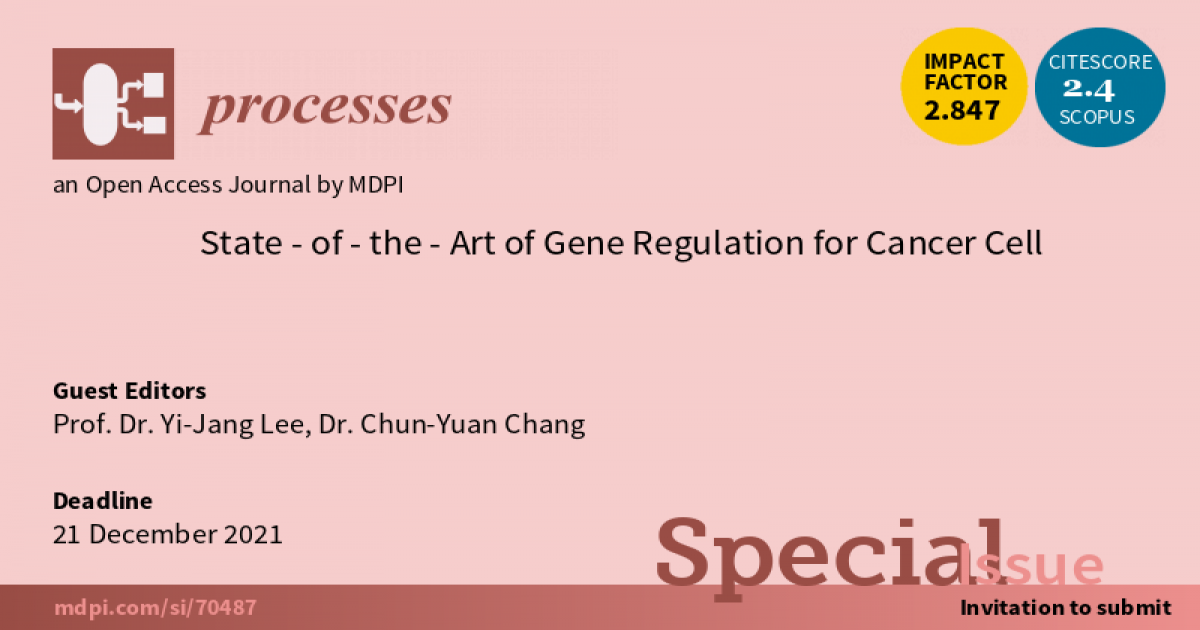- 2.8Impact Factor
- 5.5CiteScore
- 16 daysTime to First Decision
State-of-the-Art of Gene Regulation for Cancer Cell
This special issue belongs to the section “Biological Processes and Systems“.
Special Issue Information
Dear Colleagues,
Manipulation of gene regulation is the most common and critical technique in various fields of molecular and cell biological research. It is not only essential for elucidation of mechanisms of cell behaviors in the molecular level, but it is also a fundamental operation for multi-disciplinary research. For instance, gene regulatory technology could integrate with nanotechnology, pharmacology, theranostic technology, drug delivery, molecular imaging, immunology, and neuroscience to approach the biomedical questions from benchside to the bedside. Although gene therapy has not been fully regarded as a modern approach for cancer treatment, the investigation of gene regulation remains essential for evalulating the prognosis of therapeutic efficacy. The genes of interest are also verstile, including coding RNA and non-coding RNA with various lengths. The technologies for gene regulation are also greatly improved for the purposes of stable and general expression, low immunogenicity, target specific editing, low or high cell selectivity, cliinical intension, combining cell therapy, and development of cancer vaccines. Drug discovery is also largely related to the technology of gene regulation to validate the potent drug mechanisms and precise medicine. Therefore, we enthusiastically invite papers presenting novel developments and inventions of gene expression technology with the values of basic research and clinical applications for cancer therapy. The appropriate topics may include but are not limited to the following:
- Genomic editing technology for expression of cancer targeting genes
- Biocompatible vehicles for cancer specific delivery of genes
- Advanced techniques for expression and regulation of coding RNA and non-coding RNA
- Bioinformatics-based design of technology for expression and regulation of genes in cancers and therapeutic implications
Prof. Dr. Yi-Jang Lee
Dr. Chun-Yuan Chang
Guest Editors
Manuscript Submission Information
Manuscripts should be submitted online at www.mdpi.com by registering and logging in to this website. Once you are registered, click here to go to the submission form. Manuscripts can be submitted until the deadline. All submissions that pass pre-check are peer-reviewed. Accepted papers will be published continuously in the journal (as soon as accepted) and will be listed together on the special issue website. Research articles, review articles as well as short communications are invited. For planned papers, a title and short abstract (about 250 words) can be sent to the Editorial Office for assessment.
Submitted manuscripts should not have been published previously, nor be under consideration for publication elsewhere (except conference proceedings papers). All manuscripts are thoroughly refereed through a single-blind peer-review process. A guide for authors and other relevant information for submission of manuscripts is available on the Instructions for Authors page. Processes is an international peer-reviewed open access semimonthly journal published by MDPI.
Please visit the Instructions for Authors page before submitting a manuscript. The Article Processing Charge (APC) for publication in this open access journal is 2400 CHF (Swiss Francs). Submitted papers should be well formatted and use good English. Authors may use MDPI's English editing service prior to publication or during author revisions.
Keywords
- CRISPR/Cas9
- system biology
- transposon based gene delivery
- foamy virus, lentivirus, adenovirus and AAV
- coding RNA and non-coding RNA
- cancer
- Genomic editing

Benefits of Publishing in a Special Issue
- Ease of navigation: Grouping papers by topic helps scholars navigate broad scope journals more efficiently.
- Greater discoverability: Special Issues support the reach and impact of scientific research. Articles in Special Issues are more discoverable and cited more frequently.
- Expansion of research network: Special Issues facilitate connections among authors, fostering scientific collaborations.
- External promotion: Articles in Special Issues are often promoted through the journal's social media, increasing their visibility.
- e-Book format: Special Issues with more than 10 articles can be published as dedicated e-books, ensuring wide and rapid dissemination.

